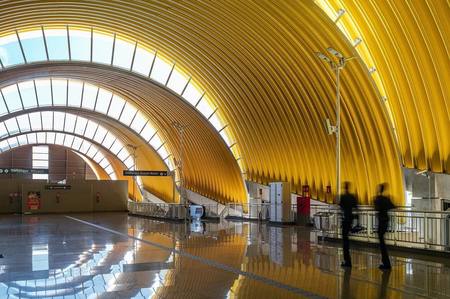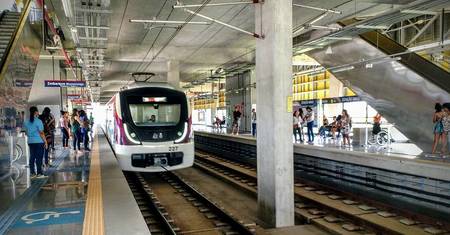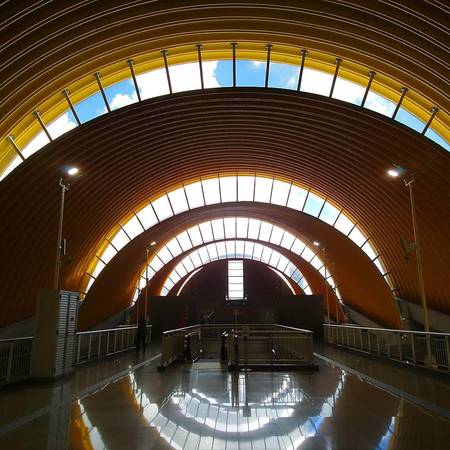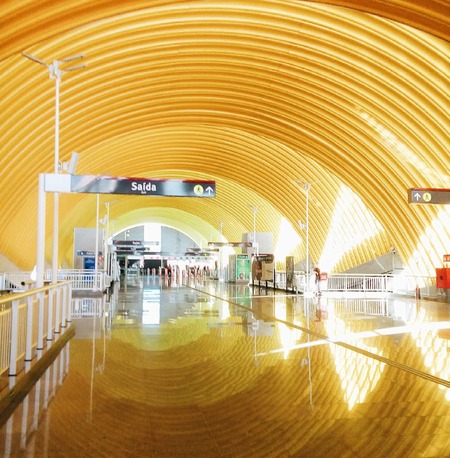The Salvador and Lauro de Freitas’ metro system, is located in Brazil, specifically in Salvador City. Currently, it’s 33,4km long, two line and 20 stations. It’s operated by the Transport Company of Bahia. This metro system took 14 years before it was inaugurated.
Salvador and Lauro de Freitas’ Metro System
History
The paperwork for the metro started in 1997, but it wasn’t until the year 2000 that the construction of The Salvador’s metro system started, whose objective was to create a direct way from Lapa to Pau de Lima. This construction was supervised by the transport Company of Bahia. Inauguration was planned for 2003, but after many delays, they proposed it was in 2008.
After these delays, they acquired 6 trains and 24 wagons, which were given in 2 parts, the first in November, 2008, and the second in January, 2009. In August of 2010, they finally sent in the rails for the metro. In 2011, there were many protests due to the delay on the inauguration. Because of this, the government declared that the metro service would be free during its initial phase. Finally, in July of 2014, the Salvador Metro’s line 1 was inaugurated by President Dilma Rouseff. It was done at this time, to transport tourists that were going to the World Cup and during this time, only tourists that had a World Cup entrance were allowed to use the system.
Lines and stations
Line 1
Currently, Line 1 has 8 stations and a length of 12.2 kilometers. Only 1.6 kilometers are underground, 4 kilometers are elevated, and 6.6 kilometers run at surface level.
 Estacao Imbui
Estacao Imbui
Stations
- 1. Lapa stations: Located in Vale do Tororo avenue, next to the Lapa, Nazare’s bus stop. It has 1 central platform, 3 escalators, 1 floor, and 3 elevators. It’s not a very tall building. It has a beautiful skylight that lets the natural light come in. It’s got a 1km long tunnel that communicates with the Campo da Polvora station. In its surroundings you may find mall Shopping Piedades, Military Base for the Municipal Guard. (It also has parking spaces for the disabled).
- 2. Campo da Pólvora station: Located in the Campo Largo da Polvora plaza, Nazaré. Has 2 lateral platforms, 18 escalators, 3 floors, 3 elevators and 2 access points of entrance. In the superior part of the building, there’s a futuristic looking skylight, that allows for natural light to come in on the first floor salon. In its surroundings you may find Ruy Barbosa lighthouse, and The Fonte Nova Arena.
- 3. Brotas station: Located in Mario Leal Ferreira avenue (Bonocô) It has 2 lateral platforms, 6 escalators, 2 floors, 3 elevators, and 2 access points or entrances. In its surroundings, you may find the Center of Service for Teens, Police Station of Juvenile Delinquents and the army hospital.
- 4. Bonocô station: Located in the Mario Leal Ferreira avenue (Bonocô). Has 2 lateral platforms, escalators, elevators, bicycle rental, and public restrooms. Is the most differential architectural project in the Boconô station. For the front, aluminum panels will be used and other architectonic pieces, to protect the place from sun and bring natural ventilation.
- 5. Acceso Norte station: Located in El Retiro street. It has 2 lateral platforms, 4 escalators, 1 floor, 3 elevators, parking for the disabled, 108 parking spots for bikes and a bus stop. Around there you may also see the mall Bela Vista and supermarket Extra.
- 6. Retiro station: Located in the furthest Street down San Antonio, Retiro. It has 2 boarding platforms, 4 escalators, 2 elevators, parking for the disabled, bicycle rental, and it connects to the bus stop and public restrooms. In its surroundings you may find Brazilian expressway BR-324, which connects with Balsas, Maranon, and Salvador; also, Luis Eduardo Magalaes avenue where you can find various hotels such as the Chasmilli Hotel.
- 7. Bom Juá station: Located in Direta do Bom Jua street. Has 2 boarding platforms, 2 escalators, 2 elevators, parking for the disabled and 78 parking spots for bikes. Nearby you may find, Federal highway BR-324, which connects Balsas, Maranon and Salvador, Luis Eduardo Magallanes avenue and Barros Reis avenue.
- 8. Pirajá station: Located in Indonesia Street. Has 2 lateral platforms, escalators, elevators, bicycle rental, and public restrooms. In its surroundings you may find Brazilian Federal Highway BR-324, which connects Balsas, Maranon and Salvador; and, Piraja’s terminal of passenger integration.

Future Expansions
Line 1
The following stations have been planned:
- Brasilgas/ Campinas station
- Cajazeiras/Aguas Claras statio
Line 2
It has 12 stations and a length of 21.2 kilometers. When the line is completed, there will be 1 more station.
- 1. Accesso Norte Station: connects Line 1 with Line 2. It has 2 side platforms, escalators, elevators, public restrooms, and a connection to the bus terminal. In its surroundings, we can find the Bela Vista Shopping Mall and the Extra Supermarket.
- 2. Detran Station: has 2 side platforms, escalators, elevators, public restrooms, and bike rental. In its surroundings, you can find the Salvador Bus Terminal.
- 3. Rodoviária Station: also has 2 side platforms, escalators, elevators, public restrooms, a connection to the bus terminal, and bike rental. In its surroundings, we can find the Bahia Shopping Mall.
- 4. Pernanbués Station.
- 5. Imbuí Station.
- 6. CAB (Bahia Administrative Center) Station.
- 7. Pituaçu Station.
- 8. Flamboyant Station.
- 9. Tamburugy Station.
- 10. Barrio de Paz Station.
- 11. Mussurunga Station.
- 12. Salvador International Airport Station.
The Lauro de Freitas Station is still under construction.
Schedule
Functions from 5:00am-12:00am every day of the week.
 salvador Metro
salvador Metro
Ticket Prices
To use the Metro, you have to choose one of the following options: One-Way Ticket, Transfer Card, SalvadorCARD, and Metropasse. These cards can be purchased at any Metro station, either at ticket offices or ATMs.
The public fare for the Metro is R$ 4.10. To pay this fare, you need to purchase a One-Way Ticket, which has an issuance cost of R$ 5.00. This issuance fee can be converted into travel credits by registering the card at a service booth.
The transfer fee from the Metro to urban buses is R$ 4.90.
The transfer fee from the Metro to metropolitan buses is R$ 4.30.
Exclusive Metro fare: those who wish to use only the Metro will pay R$ 4.10 per trip, which is the public fare for the Metro.
Type of Cards
Unity card, which gives you the right to one exclusive trip in the metro and has a Price of 3,30 reais.
Integration Card, which you can re-charge, and can be used for metro or bus. You won’t need to carry money in your pockets, just the card, which you can add as much money as you’d like, and they charge you every time you scan it. After adding 5 reais or more, the card won’t be worth anything.
“Valle-Transport” card is for employers to pay for their employee’s transport.
Student card is a re-loadable card that has a lot of benefits for the student. For students to be able to use this benefit, their educational institutions, must subscribe their students in the Bahia’s Metro System.
You may purchase the tickets in any kiosk located in every station of the Salvador Metro system. To use the metro you must deposit the cards in slots, at the entrance of the stations.
 salvador Metro
salvador Metro
Tips for safe travel in the Salvador’ Metro:
- Always go on the right side of the escalator, and hold the rail.
- Children older than 6 years old have to pay for their ticket.
- Hold children by the hand at all times.
- Keep your distance from the train before it arrives.
- Wait for the train to arrive and open its doors before crossing the yellow line, which represents safety limit.
- You will not be able to leave the train once the doors are closed.
- For your own safety, keep away from the doors when they’re opening or closing.
- Never go down to the train tracks. If a personal object were to fall, contact station staff.
- Protect your belongings.
Connection to Salvador International Airport
Salvador International Airport – Deputado Luís Eduardo Magalhães, located about 28 kilometers from the city center, offers several public transportation options to reach key areas of Salvador, such as Barra and the Pelourinho, as well as the historic downtown.
How to Get from the Airport to Barra and Salvador City Center
To reach Barra and the city center of Salvador, including Pelourinho, you can take Metro Line 2 from the "Aeroporto" station towards "Acesso Norte". Once you arrive at "Acesso Norte", you have two options:
- Barra: From "Acesso Norte", you can continue by urban bus, which directly connects to Barra. The bus ride from the "Lapa" station to Barra takes approximately 20 to 30 minutes, depending on traffic conditions.
- Salvador City Center and Pelourinho: From "Acesso Norte", transfer to Metro Line 1, which will take you to "Lapa" station in the city center. From there, you can easily access Pelourinho and other central areas.
The public transportation system in Salvador provides quick and efficient connections between the airport and the city’s main areas, making travel convenient for both tourists and residents.
Metro map of Salvador
Map via www.ccrmetrobahia.com.brSee map full resolution. It may take a little bit to load.
Download map.
Salvador Metrô Bahia map
- Also Known As: Metrô Bahia
- Passengers/Day 45000
- Fares:
- 24h operation: No
- Air Conditioning:
- Walk between platforms:
- Driverless trains: No
- Screen Doors Platforms:
- Average Speed: 40km/h
- Max. Speed: 80km/h
- Operator: Companhia de Transportes de Salvador
- 4.1 Reales
- Salvador Metro Official Website
- Tlf: 0800 071 8020
Help us
If you consider that the information we provide is wrong, not accurated, outdated, translation contains errors, and you would like to help us to improve the file...you can contact us here.
Feel free to contact us if you dont find the system you're looking for and we'll add it as soon as we can!
Thank you very much!




